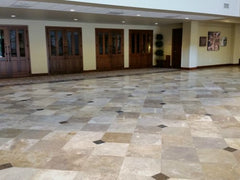About Travertine
Travertine is a beautiful, natural stone that is commonly used for flooring and medallions.
While travertine is beautiful, there are potential problems with travertine you should be aware of before selecting it for use in flooring. First, travertine is relatively soft when compared to other types of tile. This makes it more likely to scratch from foot traffic or items being dragged across it's surface, such as furniture. It also reacts to acids, such as orange juice, lemonade, sodas, etc. Spilled acidic liquids are likely to etch the surface. The use of a protective sealer can help minimize or prevent the problems associated with liquid spills as it gives you time to clean up the liquid before it stains or etches the surface.
If you decide to incorporate this beautiful stone into your home, consider the following. The quality of travertine tiles available can vary considerably - even within the same box, crate, or pallet. I have looked through open crates of travertine tiles and seen good quality, minimally pitted and well-filled, tiles right next to tiles that are highly pitted and not filled. Additionally, a highly pitted, poorly filled travertine tile is more prone to punch through which occurs when a sharp or pointed object, such as high heels, break through the surface, exposing the cavity just below the surface. The following three pictures demonstrate this. The first picture shows the front of a travertine tile that has been filled on the front. The next two pictures show the back of this same tile - with large voids that make this tile subject to punch through. Note: an experienced tile installer will minimize the likelihood of failure by filling the voids in the back with thinset ( referred to as "back buttering") as tile is being laid. The installer, however, would have a difficult time back buttering a medallion since they are attached to mesh.



That all being said, I have seen travertine successfully and beautifully used in a high traffic area: the foyer of a large local church (see pictures below). The particular travertine used actually does have some exposed pitting and rougher surface in places, yet it remains beautiful and full of character. Additionally, these problems associated with travertine are repairable: scratches and etch marks can be removed through refinishing. Even punch through can be repaired through filling the hole with various fillers available through flooring contractors or even at the home improvement stores.
As with any medallion or product made of travertine, my travertine medallions are also subject to being scratched or etched. To minimize etching, a high quality sealer should be used after installation. The more severe damage associated with punch through, which would be all the more unsightly in a medallion, is unlikely as I hand select each and every piece of travertine tile I use to ensure their quality. I choose only dense, minimally pitted and well-filled tiles.







